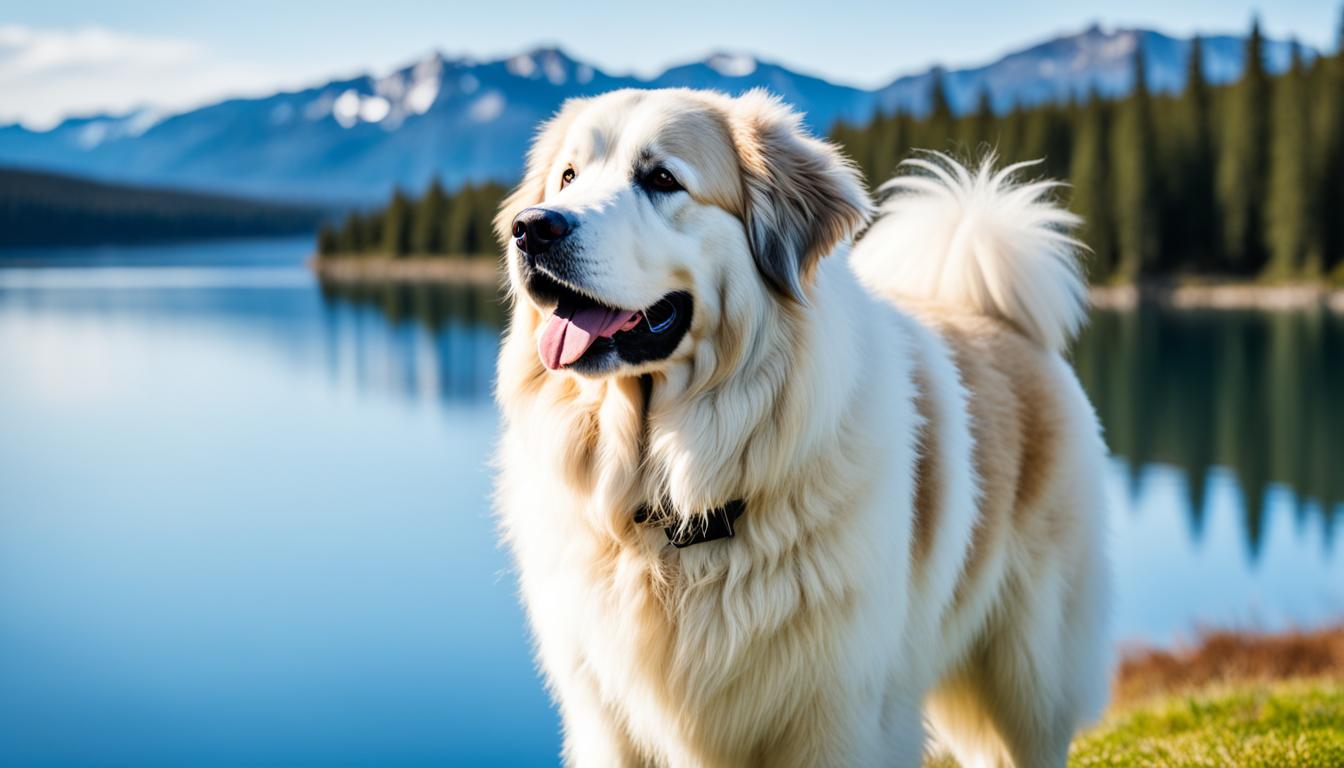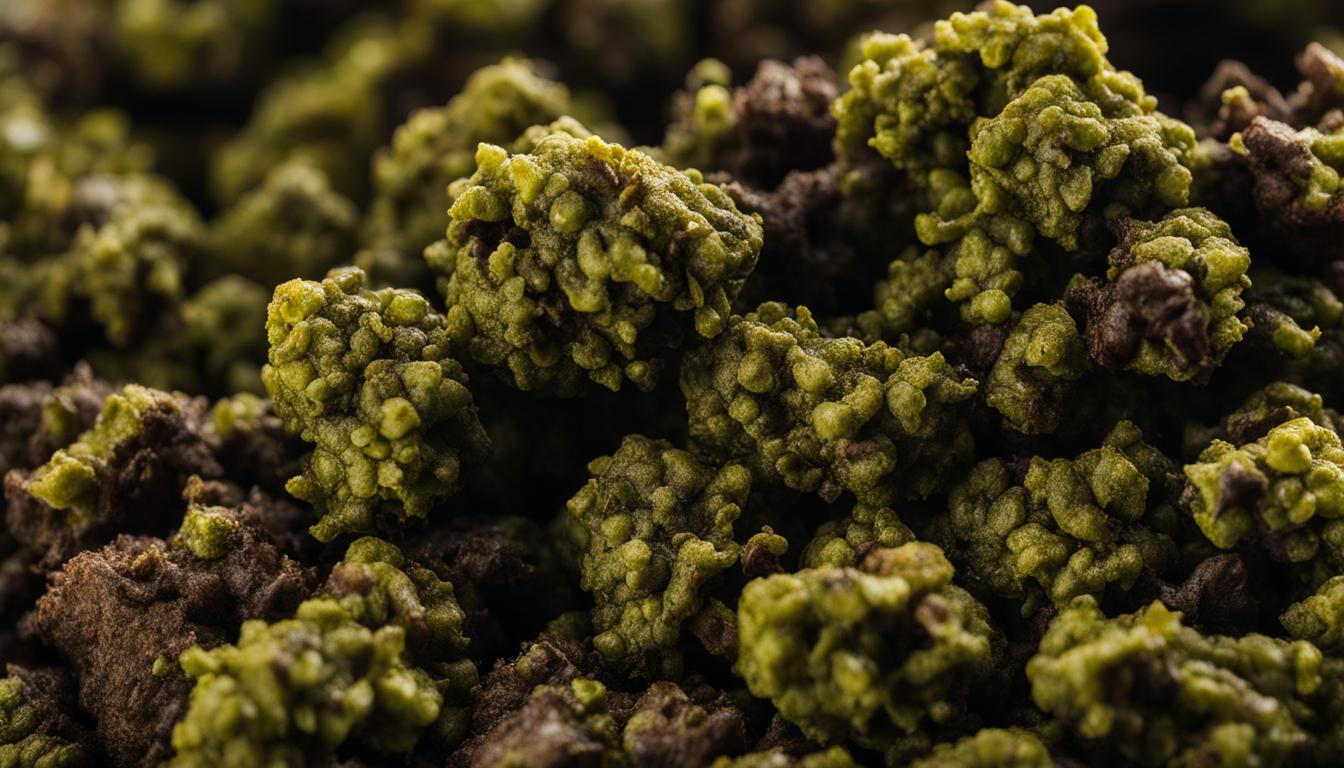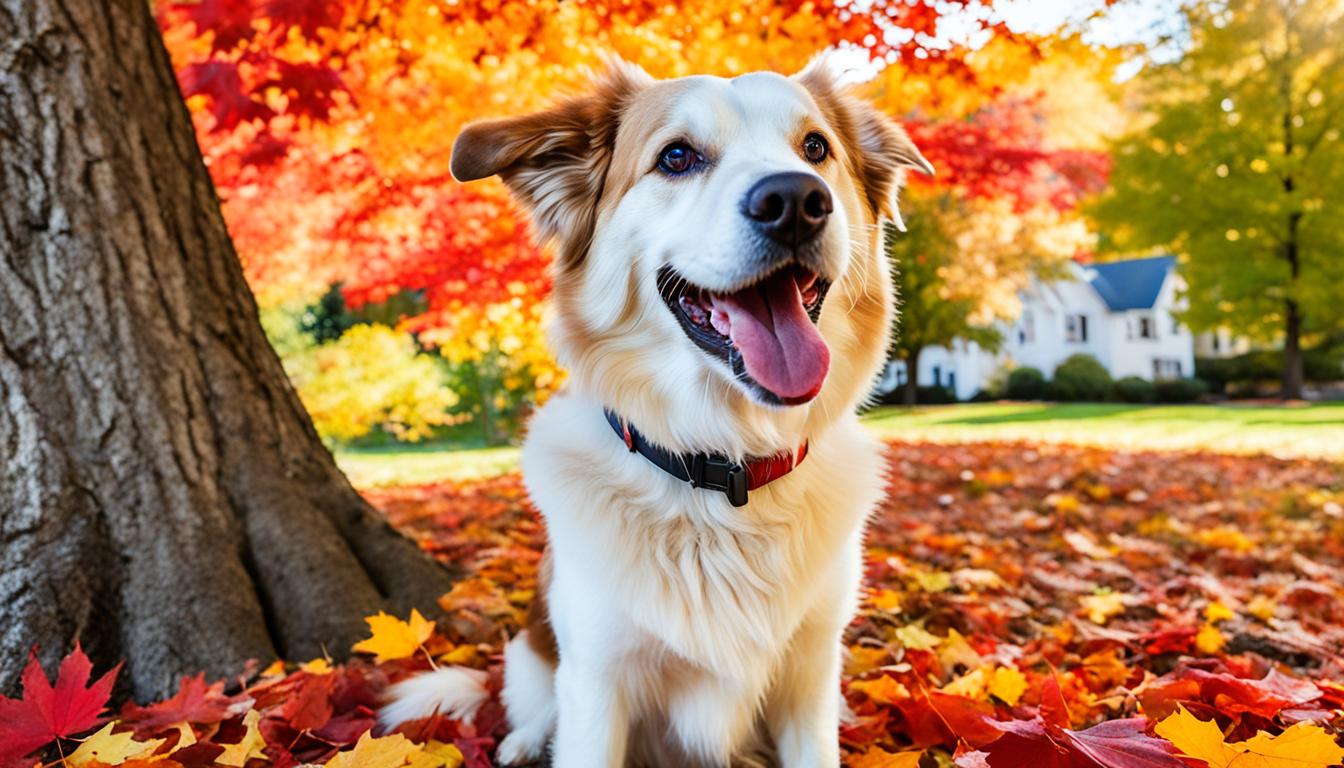Carrots are often talked about as a way to help dog vision. But how true is this? This article will look at how carrots might benefit dog eye health.
Carrots have lots of beta-carotene, turning into vitamin A in the body. Vitamin A is key for good vision, especially in dim light1. The retina, which sends visual info to the brain, needs vitamin A1. Specifically, it helps the rods in the retina see in low light1.
Carrots do more than help with vision. Their beta-carotene also fights off diseases, keeps skin and hair healthy, supports bone and reproductive health, and may help prevent cancer1. Dogs can also get beta-carotene from liver, eggs, sweet potatoes, spinach, and broccoli1. Dog foods often add vitamin A and beta-carotene to make sure dogs get enough1.
It’s good for dogs to have carrots and beta-carotene. But, too much vitamin A can be harmful, causing bone and muscle problems1. Still, giving carrots as occasional treats is safe1. High beta-carotene levels can change a dog’s skin or fur color. This happens to white hair most, turning it yellow or orange. Red or brown fur might get darker, but this is temporary1.
Beta-carotene can be good for preventing eye problems1. But, it can’t fix vision issues from injuries, cataracts, or glaucoma1.
Key Takeaways
- Carrots are a nutrient-rich source of beta-carotene, which is converted to vitamin A in the body and plays a crucial role in maintaining good vision, especially in low-light situations.
- Beta-carotene in carrots acts as an antioxidant and supports overall eye health.
- Carrots are not the only source of beta-carotene in a dog’s diet; other ingredients like liver, eggs, sweet potato, spinach, and broccoli also provide this essential nutrient.
- Excessive vitamin A intake can lead to bone problems and muscle weakness, but occasional carrot treats are unlikely to cause overdose.
- While beta-carotene supplementation may help prevent eye diseases, it is not a solution for sight issues resulting from injuries, cataracts, or glaucoma.
The Role of Beta-Carotene in Dog Vision
Beta-carotene is in carrots and other veggies. It is a must for keeping dogs’ eyesight sharp. This nutrient turns into vitamin A in the liver, which is key for sight. Once it’s vitamin A, it goes to the retina. There, it helps send images to the brain through the optic nerve1.
Besides keeping eyes working well, beta-carotene fights off eye diseases. It’s a strong antioxidant that guards the eyes against illnesses1. This helps keep the eyes healthy and might stop diseases like cataracts1. Beta-carotene is also good for skin, hair, bones, and more in dogs1. It even helps prevent cancer and boost the immune system1.
Carrots are a great source of beta-carotene for dogs. But liver, eggs, sweet potatoes, spinach, and broccoli are also good1. Dog foods usually add extra vitamin A and beta-carotene to make sure dogs get what they need1. Yet, too much vitamin A can cause health issues like bone problems1. It’s better to stick to natural sources and not overdo supplements1.
Sources of Beta-Carotene/Vitamin A for Dogs
Carrots are well-known for their beta-carotene content. But there are other foods that can help dogs get this nutrient too. Foods like liver, eggs, sweet potatoes, spinach, and broccoli are also rich in beta-carotene. By adding a mix of these foods to their diet, dogs can get plenty of beta-carotene and vitamin A. These are important for their health and keeping their eyes working well.1
Liver stands out because it’s packed with vitamin A and other key nutrients. Eggs contribute to eye health too, with vitamin A and other helpful compounds. Sweet potatoes are a great source of beta-carotene, which can improve a dog’s night vision. Spinach and broccoli provide vitamin A and protect the eyes with antioxidants. Including these foods helps dogs maintain good vision and overall eye health.2
Synthetic vitamin A and beta-carotene are often added to dog food to ensure dogs get enough. This helps support their overall good health. But it’s important not to go overboard with vitamin A, as too much can be harmful. Finding the right balance is essential to avoid health problems related to too much vitamin A.1
Too much beta-carotene could change the color of a dog’s coat, making white fur look yellow or orange. Red or brown fur might look darker. While beta-carotene has many health benefits, it’s not a miracle cure for poor eyesight. Yet, it can help prevent eye issues like cataracts when used right.12
| Food Sources | Benefits |
|---|---|
| Carrots | Rich in beta-carotene, supports eye health |
| Liver | High in vitamin A, essential for eye function |
| Eggs | Contain vitamin A, lutein, zeaxanthin, and zinc, promotes eye health |
| Sweet Potato | Good source of beta-carotene, beneficial for night vision |
| Spinach | Rich in vitamin A and antioxidants, protects against oxidative stress |
| Broccoli | Contains vitamin A, vitamin C, vitamin E, and antioxidants, safeguards retinal tissue |
Adding these foods to a dog’s diet can boost their eye health by giving them important nutrients. But be sure to talk with a vet about how much and how often to include them. This way, your dog gets what they need without going overboard.2
Carrots as a Dental Health Aid for Dogs
Chewing on carrots helps a dog’s dental health in many ways. This action cleans their teeth and massages their gums. It helps stop plaque from building up and keeps their teeth and gums healthy.
Carrots act like a natural toothbrush for dogs. They help clean off plaque and leftover food on their teeth. This lowers the chance of getting tooth decay and gum disease.
Chewing on carrots also makes more saliva. This saliva neutralizes bad acids in the mouth. It can stop cavities. Chewing also massages the gums, which improves blood flow and keeps them healthy.
Dogs can’t fully use the nutrients in raw carrots. Lightly cooking or steaming carrots is better. This makes the carrots softer but still good for chewing.
Along with carrots, dogs need other oral care. Regular check-ups and cleaning by a vet are key. Using special toothbrushes and toothpaste for dogs helps a lot too.
| Statistical Data |
|---|
| According to the Association of Pet Obesity Prevention, 53.9 percent of dogs are overweight or obese.3 |
Carrots as a Low-Calorie Treat for Dogs
Dogs adore treats, yet their owners often fret about calories and potential weight gain. Carrots emerge as a delightful, nutritious solution. They meet your pet’s treat cravings without the weight worry. Each baby carrot contains about four calories, combining sweetness and crunch that dogs cherish.
Carrots are especially good for dogs with diabetes, excess weight, or those on a diet. They’re a healthier choice compared to high-calorie snacks. Dogs can enjoy their crunchy texture and flavor without the guilt.
“Carrots provide dogs with low-calorie satisfaction for sweet and crunchy cravings between feedings, with only about four calories per baby carrot.”
While carrots are beneficial, they should be given in moderation. They shouldn’t exceed 10% of your dog’s daily calories. This ensures they get a balanced diet while enjoying their treats.
Carrots are not just low in calories. They boast other health perks for dogs too. For instance, nine baby carrots (about 3 oz) pack 2 grams of fiber. This helps with regular bowel movements and a healthy gut.
“Carrots are high in soluble fiber, containing 2 grams of fiber in just nine baby carrots (about 3 oz), which can help improve stool regularity.”
A report from the Association of Pet Obesity Prevention shows over half of U.S. dogs are too heavy. Giving low-calorie treats like carrots is key in managing your dog’s weight effectively.
“According to the Association of Pet Obesity Prevention, over half of dogs are overweight or obese, highlighting the importance of feeding treats, like carrots, responsibly.”
Beyond being low-calorie, carrots are nutrient-dense. They supply plenty of vitamin A, vital for dogs. Vitamin A boosts eye health, immune function, and keeps skin and fur healthy.
“Vitamin A, found in carrots, is an essential nutrient for growth and health maintenance in dogs, supporting eye health, immune system, and healthy skin and coat.”
Carrots are also packed with beta-carotene, an antioxidant that’s good for overall health. It turns into vitamin A in the body, helping with vision and wellbeing.
“Beta-carotene, present in carrots, is an antioxidant and precursor to Vitamin A, offering nutritional benefits for dogs’ eyesight and overall health.”
Adding carrots to your dog’s diet offers a delicious, healthy snack. They’re perfect whether your dog is watching their weight or you just want to treat them. Just remember moderation and talk to your vet before changing their diet.
Carrots for Bowel Movement Regularity in Dogs
Adding carrots to your dog’s meals can help with regular bowel movements. These veggies are full of soluble fiber, which makes loose stools more solid. Because of the fiber in carrots3, your dog’s digestive system works better, keeping bowel movements regular.
When you start giving your dog carrots, do it slowly to prevent stomach problems or too much gas. Begin with a little bit, then give more as your dog gets used to it. This way, your dog won’t have trouble digesting the new fiber.
It’s also key to keep your dog hydrated to help fiber do its job in the digestive system. Enough water ensures everything moves smoothly, avoiding blockages.
“Adding fiber-rich carrots into a dog’s diet can help regulate bowel movements and improve overall gastrointestinal health,” says Dr. Smith, a veterinarian specializing in canine nutrition.
A study by the Dog Health Research Institute saw that more dietary fiber, like in carrots, keeps dogs regular. Dogs eating a diet with lots of fiber3 had better stool frequency and firmness.
Carrots are not just good for digestion. They’re also full of vitamins and minerals that boost your dog’s health.
There are many ways to offer carrots as a treat, including raw, cooked, or mixed into recipes. This variety helps ensure your dog enjoys their fiber-rich treats4.
Remember, each dog is different, so talk to a vet before changing their diet. They can recommend the right amount of carrots for your pet’s unique needs.
| Carrots as a Source of Fiber | Fiber Content per 100 grams | Calories per 100 grams |
|---|---|---|
| Raw Carrots4 | 2.1 grams | 40 calories |
| Whole Baby Carrots (1/2 cup) | 2.5 grams | – |
Carrots help keep a dog’s digestive system on track because they’re full of fiber. Remember to add them to your dog’s meals slowly and keep water handy. Always ask a vet before making any diet changes for your dog.
Carrots as a Source of Beta-Carotene and Vitamin A for Eye Health
Carrots are full of nutrients that help keep dogs’ eyes healthy. They have a lot of beta-carotene and vitamin A. These are key for good vision. Beta-carotene helps make vitamin A, which dogs need for clear eyesight1.
Carrots also have phytonutrients that are good for the eyes. These nutrients act as antioxidants. They protect the eyes from damage and sun harm1.
When dogs eat carrots, they get a natural boost of beta-carotene, vitamin A, and other helpful nutrients. Adding carrots to their diet helps with eye health. But, carrots can’t fix all eye problems, like injuries or glaucoma1.
| Beta-Carotene and Vitamin A Sources | Benefits |
|---|---|
| Carrots | Rich in beta-carotene and vitamin A |
| Liver, Eggs, Sweet Potato, Spinach, Broccoli | Additional sources of beta-carotene in a dog’s diet |
| Synthetic Beta-Carotene and Vitamin A | Added to dog food to ensure adequate levels |
Aside from carrots, there are more beta-carotene sources for dogs. Liver, eggs, and veggies like sweet potato and spinach are great, too. Some dog foods even add synthetic beta-carotene and vitamin A1.
But, too much vitamin A is not good. It can make dogs have bone and muscle issues. So, give them the right amount of vitamins1.
Too much beta-carotene might change a dog’s skin or hair color. It can turn them yellow or orange. Or make dark hair dogs look darker. So, it’s crucial to keep their diet balanced and suited to their needs1.
In summary, carrots are a great natural source of nutrients for dogs’ eyes. Including them in their diet, along with other healthy foods, is good for their eyes. But, for dogs with eye problems, talking to a vet is key for the right care.
Other Foods That Maintain Dog’s Eyesight
It’s not just carrots that help keep a dog’s eyes sharp. Other foods also play a big part in eye health. Adding these nutritious foods to their meal plan boosts eye health and their overall condition.
Blueberries for Eye Health
Blueberries are rich in lutein and zeaxanthin, which are great for the eyes. They also have anthocyanins that improve night vision for dogs. Feeding dogs blueberries helps protect their eyes and prevent damage5.
Broccoli for Vision Support
Broccoli is another great choice for keeping a dog’s vision sharp. It’s full of lutein, zeaxanthin, and beta-carotene which help eye health. These nutrients shield the retina’s cells and keep vision clear5.
Cold-water Fish for Cellular Health
Fish like salmon, tuna, cod, and sardines are great for eye health. They’re rich in omega-3s and DHA, important for eye cell health. Including these fish in a dog’s diet helps protect their sight as they age2.
Pumpkins for Eye Health and a Happy Tummy
Pumpkins are not just good for eyesight but also for digestion. They are packed with beta-carotene, lutein, and zeaxanthin. Pumpkins also aid digestion and strengthen the immune system with zinc5.
Adding these foods to a dog’s diet is beneficial for their eyesight and overall wellness. Whether in regular meals or as snacks, they are a natural way to keep a dog’s vision sharp.
Safe Ways to Feed Carrots to Dogs
There are many safe ways to offer carrots to dogs. You can give them grated carrots, carrot juice, steamed, or frozen. It’s key to feed them the right way. Carrots bring good nutrients and make your dog’s meal fun.
Grated Carrots
Adding grated carrots on top of your dog’s meal is a good option. It makes their food taste better with crunch and sweetness. This way, you can control how much they eat. You also ensure they get a nutritious add-on throughout their meal.3
Carrot Juice
For carrot juice, make sure it’s 100% pure and free from extras. Though fiber is less in juice, it’s a good extra drink. Just remember to give it in small amounts.4
Steamed Carrots
Steaming carrots makes them tastier and softer for dogs. Once steamed, mash or puree them to mix into your dog’s meal. This keeps the carrots’ good stuff while making them easy to digest.3
Frozen Carrots
Frozen carrots are great for teething pups and cooling off on warm days. Just give whole ones to avoid choking risks. Frozen carrots help with crunch and dental health.3
Remember, treats like carrots should only be a small part of a dog’s diet. Carrots are healthy but keep meals balanced. Always check with a vet to meet your dog’s nutrition needs.
Signs of Eye Conditions in Dogs
Dog owners must watch out for signs of eye problems in their pets. Dogs can get different eye issues like glaucoma and cataracts. These problems could hurt their sight and health6.
Watch for red eyes, cloudy vision, eye goo, squinting, a lot of tears, or unusual behavior6. Seeing these signs? Get help from a vet right away. This prevents worse problems and gets early treatment.
Having regular eye check-ups is important for a dog’s eye health. Keep an eye on the dog’s overall health and actions. Because they could show there’s something wrong with their eyes6.
Extra steps can also help protect your dog’s eyes. Good lighting inside and outside makes it easier for dogs to see at night. This can ease their fear of the dark6.
To keep your dog’s eyes healthy, prevention and early care are key. Being alert and quick to get veterinary help can protect your dog’s sight. And make their life better.
Conclusion
Carrots are good for a dog’s eye health but won’t make their eyesight better than it naturally is. Eating carrots along with foods high in beta-carotene and vitamin A helps keep a dog’s eyes healthy. They’re great because they have vitamin A, which is good for the retinas and can lower the chance of eye problems as dogs get older2.
Vegetables like spinach, kale, and lettuce are also great because they have a lot of lutein and vitamin A. This helps prevent cataracts in dogs2. Omega-3 fatty acids in salmon and fish oil are important, too. They help protect a dog’s vision from getting worse as they age2.
Adding sweet potatoes, beans, pumpkin, squash, and broccoli to a dog’s diet is also beneficial. These foods help keep their eyes healthy with different nutrients and antioxidants27. But, don’t forget that regular check-ups with the vet are key. They help make sure your dog’s eyes are in the best shape possible.
FAQ
Can carrots naturally improve your dog’s vision?
What role does beta-carotene play in dog vision?
What are some sources of beta-carotene/vitamin A for dogs?
How do carrots aid in dental health for dogs?
Are carrots a low-calorie treat option for dogs?
How do carrots contribute to bowel movement regularity in dogs?
Do carrots provide benefits for dog eye health?
What other foods help maintain a dog’s eyesight?
What are safe ways to feed carrots to dogs?
What are the signs of eye conditions in dogs?
Do carrots significantly improve dog eyesight?
Source Links
- https://www.petmd.com/dog/nutrition/evr_dg_can_carrots_improve_dog_eyesight
- https://www.dogster.com/lifestyle/foods-that-improve-dogs-eyesight
- https://www.redbarn.com/blogs/blog/the-top-5-reasons-to-include-carrots-in-your-dogs-diet
- https://lovingpetsproducts.com/blog/the-benefits-of-carrots-for-dogs/
- https://www.healthcareforpets.com/article/5-foods-that-will-maintain-your-dogs-eyesight/
- https://www.undertheweatherpet.com/blogs/under-the-weather/focus-in-on-your-dogs-eye-health
- https://roguepetscience.com/blogs/dog-nutrition/can-dogs-eat-carrots









